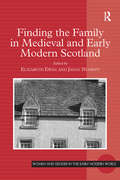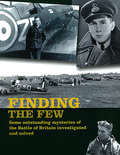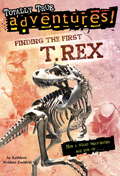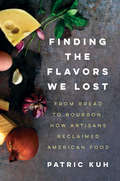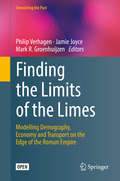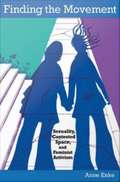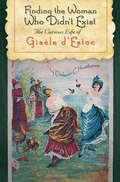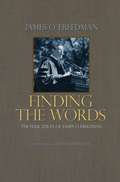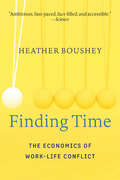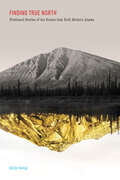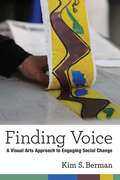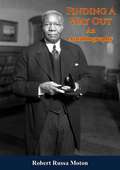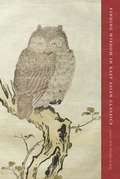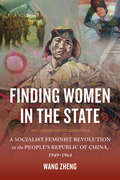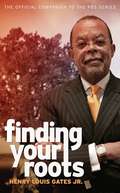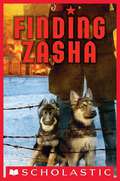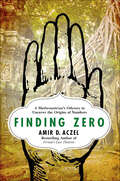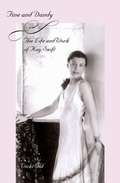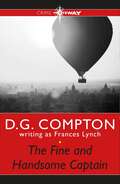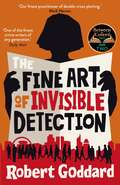- Table View
- List View
Finding the Family in Medieval and Early Modern Scotland (Women and Gender in the Early Modern World)
by Elizabeth Ewan and Janay NugentIn this interdisciplinary collaboration, an international group of scholars have come together to suggest new directions for the study of the family in Scotland circa 1300-1750. Contributors apply tools from across a range of disciplines including art history, literature, music, gender studies, anthropology, history and religious studies to assess creatively the broad range of sources which inform our understanding of the pre-modern Scottish family. A central purpose of this volume is to encourage further studies in this area by highlighting the types of sources available, as well as actively engaging in broader historiographical debates to demonstrate how important and effective family studies are to advancing our understanding of the past. Articles in the first section demonstrate the richness and variety of sources that exist for studies of the Scottish family. These essays clearly highlight the uniqueness, feasibility and value of family studies for pre-industrial Scotland. The second and third sections expand upon the arguments made in part one to demonstrate the importance of family studies for engaging in broader historiographical issues. The focus of section two is internal to the family. These articles assess specific family roles and how they interact with broader social forces/issues. In the final section the authors explore issues of kinship ties (an issue particularly associated with popular images of Scotland) to examine how family networks are used as a vehicle for social organization.
Finding the Few: Some Outstanding Mysteries of the Battle of Britain Investigated and Solved
by Andy SaundersAn &“extraordinarily researched&” account of a quest to find MIA fighter pilots decades after World War II (Barrett Tillman). 1940: The air over Britain is filled with danger. Courageous and heroic men fly and fight, often sacrificing their lives to keep the nation free. Some of them will disappear into the summer sky without leaving a trace . . . This remarkable book records the lives of RAF pilots who were shot down and remained missing for decades—until diligent research efforts by author Andy Saunders and others brought identification to them and closure to their families. Each case represents a fascinating human story of drama, love, and tragedy; these stories are filled with startling detective work, remarkable coincidences, and shocking controversy. Finding the Few ends with a mystery still unsolved, and features photographs throughout, standing as a fitting testament to those men lost but not forgotten.
Finding the First T. REX
by Kathleen Weidner ZoehfeldIN 1902, WILLIAM HORNADAY handed a map to the famous paleontologist Barnum Brown. It was Hornaday’s hand-drawn directions to a remote area of the Montana Badlands, where he believed amazing dinosaur fossils lay buried. Following the map, Brown dug up a jawbone edged with six-inch long teeth, the remains of a monstrous creature no one had ever seen before. But one bone wasn’t enough, and Brown soon found himself in a desperate race to discover the skeleton of the mystery carnivore! From the Trade Pap...
Finding the First T. Rex (Totally True Adventures)
by Kathleen Weidner Zoehfeld Jim NelsonIN 1902, WILLIAM HORNADAY handed a map to the famous paleontologist Barnum Brown. It was Hornaday's hand-drawn directions to a remote area of the Montana Badlands, where he believed amazing dinosaur fossils lay buried. Following the map, Brown dug up a jawbone edged with six-inch long teeth, the remains of a monstrous creature no one had ever seen before. But one bone wasn't enough, and Brown soon found himself in a desperate race to discover the skeleton of the mystery carnivore!From the Trade Paperback edition.
Finding the Flavors We Lost: From Bread to Bourbon, How Artisans Reclaimed American Food
by Patric KuhThe multiple-James Beard Award-winning restaurant critic for Los Angeles Magazine delivers an arresting exploration of our cultural demand for "artisanal" foods in a world dominated by corporate agribusiness.We hear the word "artisanal" all the time--attached to cheese, chocolate, coffee, even fast-food chain sandwiches--but what does it actually mean? We take "farm to table" and "handcrafted food" for granted now but how did we get here? In Finding the Flavors We Lost, acclaimed food writer Patric Kuh profiles major figures in the so-called "artisanal" food movement who brought exceptional taste back to food and inspired chefs and restaurateurs to redefine and rethink the way we eat.Kuh begins by narrating the entertaining stories of countercultural "radicals" who taught themselves the forgotten crafts of bread, cheese, and beer-making in reaction to the ever-present marketing of bland, mass-produced food, and how these people became the inspiration for today's crop of young chefs and artisans. Finding the Flavors We Lost also analyzes how population growth, speedier transportation, and the societal shifts and economic progress of the twentieth century led to the rise of supermarkets and giant food corporations, which encouraged the general desire to swap effort and quality for convenience and quantity.Kuh examines how a rediscovery of the value of craft and individual effort has fueled today's popularity and appreciation for artisanal food and the transformations this has effected on both the restaurant menu and the dinner table. Throughout the book, he raises a host of critical questions. How big of an operation is too big for a food company to still call themselves "artisanal"? Does the high cost of handcrafted goods unintentionally make them unaffordable for many Americans? Does technological progress have to quash flavor? Eye-opening, informative, and entertaining, Finding the Flavors We Lost is a fresh look into the culture of artisan food as we know it today--and what its future may be.
Finding the Limits of the Limes: Modelling Demography, Economy and Transport on the Edge of the Roman Empire (Computational Social Sciences)
by Philip Verhagen Jamie Joyce Mark R. GroenhuijzenThis open access book demonstrates the application of simulation modelling and network analysis techniques in the field of Roman studies. It summarizes and discusses the results of a 5-year research project carried out by the editors that aimed to apply spatial dynamical modelling to reconstruct and understand the socio-economic development of the Dutch part of the Roman frontier (limes) zone, in particular the agrarian economy and the related development of settlement patterns and transport networks in the area. The project papers are accompanied by invited chapters presenting case studies and reflections from other parts of the Roman Empire focusing on the themes of subsistence economy, demography, transport and mobility, and socio-economic networks in the Roman period.The book shows the added value of state-of-the-art computer modelling techniques and bridges computational and conventional approaches. Topics that will be of particular interest to archaeologists are the question of (forced) surplus production, the demographic and economic effects of the Roman occupation on the local population, and the structuring of transport networks and settlement patterns. For modellers, issues of sensitivity analysis and validation of modelling results are specifically addressed. This book will appeal to students and researchers working in the computational humanities and social sciences, in particular, archaeology and ancient history.
Finding the Movement: Sexuality, Contested Space, and Feminist Activism
by Anne EnkeIn Finding the Movement, Anne Enke reveals that diverse women's engagement with public spaces gave rise to and profoundly shaped second-wave feminism. Focusing on women's activism in Detroit, Chicago, and Minneapolis-St. Paul during the 1960s and 1970s, Enke describes how women across race and class created a massive groundswell of feminist activism by directly intervening in the urban landscape. They secured illicit meeting spaces and gained access to public athletic fields. They fought to open bars to women and abolish gendered dress codes and prohibitions against lesbian congregation. They created alternative spaces, such as coffeehouses, where women could socialize and organize. They opened women-oriented bookstores, restaurants, cafes, and clubs, and they took it upon themselves to establish women's shelters, health clinics, and credit unions in order to support women's bodily autonomy. By considering the development of feminism through an analysis of public space, Enke expands and revises the historiography of second-wave feminism. She suggests that the movement was so widespread because it was built by people who did not identify themselves as feminists as well as by those who did. Her focus on claims to public space helps to explain why sexuality, lesbianism, and gender expression were so central to feminist activism. Her spatial analysis also sheds light on hierarchies within the movement. As women turned commercial, civic, and institutional spaces into sites of activism, they produced, as well as resisted, exclusionary dynamics.
Finding the Right Words
by Claudia Di SciaccaIsidore of Seville (circa 570-636) was the author of the Etymologiae,. the most celebrated and widely circulated encyclopaedia of the western Middle Ages. In addition, Isidore's Synonyma were very successful and became one of the classics of medieval spirituality. Indeed, it was the Synonyma that were to define the so-called 'Isidorian style,' a rhymed, rhythmic prose that proved influential throughout the Middle Ages.Finding the Right Words is the first book-length study to deal with the transmission and reception of works by Isidore of Seville in Anglo-Saxon England, with a particular focus on the Synonyma. Beginning with a general survey of Isidore's life and activity as a bishop in early seventh-century Visigothic Spain, Claudia Di Sciacca offers a comprehensive introduction to the Synonyma, drawing special attention to their distinctive style. She goes on to discuss the transmission of the text to early medieval England and its 'vernacularisation,' that is, its translations and adaptations in Old English prose and verse. The case for the particular receptiveness of the Synonyma in Anglo-Saxon England is strongly supported by both a close reading of primary sources and an extensive selection of secondary literature. This rigorous, well-documented volume demonstrates the significance of the Synonyma to our understanding of the literary pretensions and pedagogical practices of Anglo-Saxon England, and offers new insights into the interaction of Latin and vernacular within its literary culture.
Finding the Woman Who Didn't Exist: The Curious Life of Gisèle d'Estoc
by Melanie C. HawthorneGisèle d&’Estoc was the pseudonym of a nineteenth-century French woman writer and, it turns out, artist who, among other things, was accused of being a bomb-planting anarchist, the cross-dressing lover of writer Guy de Maupassant, and the fighter of at least one duel with another woman, inspiring Bayard&’s famous painting on the subject. The true identity of this enigmatic woman remained unknown and was even considered fictional until recently, when Melanie C. Hawthorne resurrected d&’Estoc&’s discarded story from the annals of forgotten history.Finding the Woman Who Didn&’t Exist begins with the claim by expert literary historians of France on the eve of World War II that the woman then known only as Gisèle d&’Estoc was merely a hoax. More than fifty years later, Hawthorne not only proves that she did exist but also uncovers details about her fascinating life and career, along the way adding to our understanding of nineteenth-century France, literary culture, and gender identity. Hawthorne explores the intriguing life of the real d&’Estoc, explaining why others came to doubt the &“experts&” and following the threads of evidence that the latter overlooked. In focusing on how narratives are shaped for particular audiences at particular times, Hawthorne also tells &“the story of the story,&” which reveals how the habits of thought fostered by the humanities continue to matter beyond the halls of academe.
Finding the Words: The Education of James O. Freedman
by James O. FreedmanJames Freedman, the fifteenth president of Dartmouth College, began life in a struggling middle-class Jewish family in a provincial industrial New Hampshire town. By the time of his death from cancer in March 2006, he was one of the most celebrated educational leaders of his generation, perhaps of the twentieth century. Finding the Words is Freedman's account of the first twenty-seven years of this astonishing trajectory in a life made difficult by depression, but sustained throughout by a love of books and learning, a life that would transform the culture of American higher education. His mother's fierce and bruising ambition instilled in him an overwhelming drive to leave his mark upon the world. His father, a revered high-school English teacher who was timid outside the classroom, introduced him to the rich world of literature--and also passed on to him his doubts and insecurities. Freedman retraces his intellectual formation as a student, educator, scholar, and leader, from his early?obsession with book collecting through his undergraduate years at Harvard and his professional training at Yale Law School. This same passion for language and ideas defined Freedman's leadership at Dartmouth, where he deftly countered lingering anti-Semitism, fought entrenched interests to open the way for women and minorities, reformed and revitalized the curriculum, and boldly reconceived the school's campus. This moving and inspiring book vividly depicts the formative years of a man nourished by lifelong learning, whose rise from humble beginnings to heights of achievement will serve as a model for generations to come.
Finding Time: The Economics of Work-Life-Conflict
by Heather BousheyEmployers demand more of employees' time while leaving the important things in life--health, family--for workers to take care of on their own time and dime. How can workers get ahead while making sure their families don't fall behind? Heather Boushey shows in detail that economic efficiency and equity do not have to be enemies.
Finding True North: First-Hand Stories of the Booms that Built Modern Alaska
by Molly RettigMelting sea ice and rumbling volcanoes. Sled dogs racing through unnamed valleys. These were the images that came to mind when Molly Rettig moved to Fairbanks, Alaska to work as a reporter at the local newspaper. An avid environmentalist, she couldn’t wait to explore the vast, untamed spaces that had largely been paved over on the east coast. But when her 72-year-old neighbor, Clutch, invites her on a tour of his gold mine—an 800-foot tunnel blasted into the side of his house–she begins to question many of her ideas about Alaska, and about herself. In Finding True North, Rettig takes us on a gripping journey through Alaska's past that brings alive the state's magnificent country and its quirky, larger-than-life characters. She meets a trapper who harvests all she needs from the land, a bush pilot who taught himself how to fly, and an archaeologist who helped build an oil pipeline through pristine wilderness. While she learns how airplanes, mines, and oil fields have paved the way for newcomers like herself, she also stumbles upon a bigger question: what has this quest for Alaska’s natural resources actually cost, and how much more is at stake? This is a book about all the ways wild places teach us about ourselves. Rettig writes both playfully and honestly about how one place can be many things to many people—and how all of it can be true.
Finding Voice: A Visual Arts Approach to Engaging Social Change
by Kim S BermanIn Finding Voice, Kim Berman demonstrates how she was able to use visual arts training in disenfranchised communities as a tool for political and social transformation in South Africa. Using her own fieldwork as a case study, Berman shows how hands-on work in the arts with learners of all ages and backgrounds can contribute to economic stability by developing new skills, as well as enhancing public health and gender justice within communities. Berman’s work, and the community artwork her book documents, present the visual arts as a crucial channel for citizens to find their individual voices and to become agents for change in the arenas of human rights and democracy.
Finding A Way Out: An Autobiography
by Robert Russa MotonFrom slave to successor to Booker T. Washington as head of the Tuskegee Institute is a personal story of an African-American and his struggles during the Ante-Bellum years.Robert Russa Moton was born in Amelia County, Virginia, on August 26, 1867, and was raised in nearby Rice, Prince Edward County, Virginia. He was the grandson of an African chieftain who had grown wealthy by engaging in slave trading. Later this chief was himself sold into slavery, leading to the establishment of Moton's family in the Americas shortly thereafter.In 1915, after the death of Booker T. Washington, Moton succeeded Washington as the second principal of the Tuskegee Institute. While supporting the work-study program, he emphasized education, integrating liberal arts into the curriculum, establishing bachelor of science degrees in agriculture and education. He improved courses of study, especially in teacher training, elevated the quality of the faculty and administration, constructed new facilities, and significantly increased the endowment by maintaining his connections to wealthy white benefactors in the North.
Finding Wisdom in East Asian Classics
by De Bary Wm. Theodore Ed.Finding Wisdom in East Asian Classics is an essential, all-access guide to the core texts of East Asian civilization and culture. Essays address frequently read, foundational texts in Chinese, Japanese, Korean, and Vietnamese, as well as early modern fictional classics and nonfiction works of the seventeenth century. Building strong links between these writings and the critical traditions of Confucianism, Buddhism, and Daoism, this volume shows the vital role of the classics in the shaping of Asian history and in the development of the humanities at large.Wm. Theodore de Bary focuses on texts that have survived for centuries, if not millennia, through avid questioning and contestation. Recognized as perennial reflections on life and society, these works represent diverse historical periods and cultures and include the Analects of Confucius, Mencius, Laozi, Xunxi, the Lotus Sutra, Tang poetry, the Pillow Book, The Tale of Genji, and the writings of Chikamatsu and Kaibara Ekken. Contributors explain the core and most commonly understood aspects of these works and how they operate within their traditions. They trace their reach and reinvention throughout history and their ongoing relevance in modern life. With fresh interpretations of familiar readings, these essays inspire renewed appreciation and examination. In the case of some classics open to multiple interpretations, de Bary chooses two complementary essays from different contributors. Expanding on debates concerning the challenges of teaching classics in the twenty-first century, several pieces speak to the value of Asia in the core curriculum. Indispensable for early scholarship on Asia and the evolution of global civilization, Finding Wisdom in East Asian Classics helps one master the major texts of human thought.
Finding Wisdom in East Asian Classics
by William Theodore de BaryThe perfect companion to courses in Asian civilization and culture, Finding Wisdom in East Asian Classics provides nonspecialists with essential background on frequently assigned texts. With essays addressing foundational materials in Chinese, Japanese, Korean, and Vietnamese traditions, including Confucianism, Buddhism, Daoism, and early modern fictional classics up to the seventeenth century, this guide works in any classroom and with readers at all levels. It demonstrates the particular link between each text and its tradition and proves the global relevance of Asian classics to the humanities at large. Wm. Theodore de Bary combines reprinted and original essays on texts that have survived for centuries, if not millennia, through avid questioning and contestation. Recognized as perennial reflections on life and society, these works represent diverse historical periods and cultures and include the Laozi, the Xunxi, the Lotus Sutra, Tang poetry, the Pillow Book, The Tale of Genji, and the writings of Mencius, Chikamatsu, and Kaibara Ekken. Contributors explain the central and most commonly understood aspects of these works and how they operate within their traditions. They trace their reach and reinvention over the centuries and identify their ongoing value to modern life. With fresh interpretations of familiar readings, these essays inspire renewed appreciation and examination. In the case of some classics open to multiple interpretation, the guide features two complementary essays from different contributors. Expanding on debates concerning the challenges of teaching classics in the twenty-first century, several pieces speak to the value of Asia in the core curriculum and the necessity of reinforcing the significance of such works as the Analects. Indispensable for early scholarship on Asia and the development of global civilization, Finding Wisdom helps readers master the major texts of human thought.
Finding Women in the State: A Socialist Feminist Revolution in the People's Republic of China, 1949-1964
by Wang ZhengFinding Women in the State is a provocative hidden history of socialist state feminists maneuvering behind the scenes at the core of the Chinese Communist Party. These women worked to advance gender and class equality in the early People's Republic and fought to transform sexist norms and practices, all while facing fierce opposition from a male-dominated CCP leadership from the Party Central to the local government. Wang Zheng extends this investigation to the cultural realm, showing how feminists within China's film industry were working to actively create new cinematic heroines, and how they continued a New Culture anti-patriarchy heritage in socialist film production. This book illuminates not only the different visions of revolutionary transformation but also the dense entanglements among those in the top echelon of the party. Wang discusses the causes for failure of China's socialist revolution and raises fundamental questions about male dominance in social movements that aim to pursue social justice and equality. This is the first book engendering the PRC high politics and has important theoretical and methodological implications for scholars and students working in gender studies as well as China studies.
Finding Your Roots
by Henry Louis Gates David AltshulerWho are we, and where do we come from? The fundamental drive to answer these questions is at the heart of Finding Your Roots, the companion book to the PBS documentary series seen by 30 million people. As Harvard scholar Henry Louis Gates Jr. shows us, the tools of cutting-edge genomics and deep genealogical research now allow us to learn more about our roots, looking further back in time than ever before. Gates's investigations take on the personal and genealogical histories of more than twenty luminaries, including United States Congressman John Lewis, actor Robert Downey Jr., CNN medical correspondent Sanjay Gupta, President of the "Becoming American Institute" Linda Chavez, and comedian Margaret Cho. Interwoven with their moving stories of immigration, assimilation, strife, and success, Gates provides practical information for amateur genealogists just beginning archival research on their own families' roots, and he details the advances in genetic research now available to the public. The result is an illuminating exploration of who we are, how we lost track of our roots, and how we can find them again.
Finding Your Roots: How Every American Can Trace His Ancestors At Home and Abroad
by Jeane Eddy WestinJeane Westin's Finding Your Roots will help you take an enjoyable and challenging journey into the past. The author is a skillful writer, well acquainted with her subject. She has prepared a practical and easy-to-follow, step-by-step itinerary of where to go, how to do it, and what to do when you get there.
Finding Zasha
by Randi BarrowRandi Barrow is back with another gripping heroic World War II story about a boy and his best friend, a German shepherd! In 1941, the Germans began the long, bloody siege on Leningrad. During the chaos, twelve-year-old Ivan is sent to live with relatives when his mother's job is moved to the mountains. But it is a long and dangerous journey to get out of Leningrad. After settling into a new town it falls under Nazi occupation and Ivan is picked by Axel Recht, an especially heinous soldier, to come work for the Nazis. One of Ivan's more pleasant tasks is to train Alex's dogs. Yet Ivan is determined to use his position to undermine the Nazis and rescue the dogs. But Ivan underestimates Axel's attachment to Zasha and Thor, and soon finds himself being hunted by a ruthless soldier who will stop at nothing to get his dogs back. As World War II rages around them, Ivan must find a way to hide from Axel, protect Zasha and Thor, avoid the constant barrage of deadly bombings, and survive in the devastating conditions of a city cut off from the world.
Finding Zero: A Mathematician's Odyssey to Uncover the Origins of Numbers
by Amir D. AczelThe invention of numerals is perhaps the greatest abstraction the human mind has ever created. Virtually everything in our lives is digital, numerical, or quantified. The story of how and where we got these numerals, which we so depend on, has for thousands of years been shrouded in mystery. Finding Zero is an adventure filled saga of Amir Aczel's lifelong obsession: to find the original sources of our numerals. Aczel has doggedly crisscrossed the ancient world, scouring dusty, moldy texts, cross examining so-called scholars who offered wildly differing sets of facts, and ultimately penetrating deep into a Cambodian jungle to find a definitive proof. Here, he takes the reader along for the ride. The history begins with the early Babylonian cuneiform numbers, followed by the later Greek and Roman letter numerals. Then Aczel asks the key question: where do the numbers we use today, the so-called Hindu-Arabic numerals, come from? It is this search that leads him to explore uncharted territory, to go on a grand quest into India, Thailand, Laos, Vietnam, and ultimately into the wilds of Cambodia. There he is blown away to find the earliest zero—the keystone of our entire system of numbers—on a crumbling, vine-covered wall of a seventh-century temple adorned with eaten-away erotic sculptures. While on this odyssey, Aczel meets a host of fascinating characters: academics in search of truth, jungle trekkers looking for adventure, surprisingly honest politicians, shameless smugglers, and treacherous archaeological thieves—who finally reveal where our numbers come from.
Fine and Dandy: The Life and Work of Kay Swift
by Vicki OhlKay Swift (1897-1993) was one of the few women composers active on Broadway in the first half of the twentieth century. Best known as George Gershwin's assistant, musical adviser, and intimate friend, Swift was in fact an accomplished musician herself, a pianist and composer whose Fine and Dandy (1930) was the first complete Broadway musical written by a woman. This book - the first biography of Swift - discusses her music and her extraordinary life. Vicki Ohl describes Swift's work for musical theater, the ballet, Radio City Music Hall's Rockettes, and commercial shows. She also tells how Swift served as director of light music for the 1939 World's Fair, eloped with a cowboy from the rodeo at the fair, and abandoned her native New York for Oregon, later fashioning her experiences into an autobiographical novel, Who Could Ask for Anything More? Informed by material, including Swift's unpublished memoirs and extensive interviews with her family members and friends, this book captures the essence and spirit of a remarkable woman. --BOOK JACKET. Title Summary field provided by Blackwell North America, Inc. All Rights Reserved
The Fine and Handsome Captain
by Frances Lynch D G ComptonWill she ever escape her past?Romantic suspense for fans of Joan Aiken and BridgertonYoung Hester Malpass knew little of her past. Only that she was an orphan who was now working in a railway station restaurant for a tyrannical old woman. She dreamed of escape, of finding a brighter place for herself out in the world. Then one day, dashing Captain Deveraux, a famous balloonist, lured her away to become his partner in a new aerial adventure. Had Hester not fallen in love with the captain, she would never have dared. But dare she did. Life took a violent and frightening turn. Suddenly Hester was confronted with the strange ghosts of her past, and the deadly secret of the fine and handsome captain.
The Fine and Handsome Captain
by Frances Lynch D G ComptonWill she ever escape her past?Romantic suspense for fans of Joan Aiken and BridgertonYoung Hester Malpass knew little of her past. Only that she was an orphan who was now working in a railway station restaurant for a tyrannical old woman. She dreamed of escape, of finding a brighter place for herself out in the world. Then one day, dashing Captain Deveraux, a famous balloonist, lured her away to become his partner in a new aerial adventure. Had Hester not fallen in love with the captain, she would never have dared. But dare she did. Life took a violent and frightening turn. Suddenly Hester was confronted with the strange ghosts of her past, and the deadly secret of the fine and handsome captain.
The Fine Art of Invisible Detection: The thrilling BBC Between the Covers Book Club pick
by Robert Goddard'One of the finest crime writers of any generation' Daily Mail'He's the high priest of plot ... deftly woven, but also beautifully written ... I loved it' Mel Giedroyc_______________________________Umiko Wada has recently had quite enough excitement in her life. With her husband recently murdered and a mother who seems to want her married again before his body is cold, she just wants to keep her head down.As a secretary to a private detective, her life is pleasingly uncomplicated, filled with coffee runs, diary management and paperwork.That is, until her boss takes on a new case. A case which turns out to be dangerous enough to get him killed. A case which means Wada will have to leave Japan for the first time and travel to London.Following the only lead she has, Wada quickly realises that being a detective isn't as easy as the television makes out. And that there's a reason why secrets stay buried for a long time. Because people want them to stay secret. And they're prepared to do very bad things to keep them that way...A pulse-pounding, breathless crime thriller, perfect for fans of Anthony Horowitz's Hawthorne series, Robert Galbraith's Cormoran Strike series and LJ Ross's Alexander Gregory thrillers.The new Umiko Wada novel from Robert Goddard, THE FINE ART OF UNCANNY PREDICTION, is available now._______________________________What readers are saying:'5 stars''Guaranteed and satisfying escapism''Edge-of-the-seat stuff''The master of twists and suspense... sublime'
